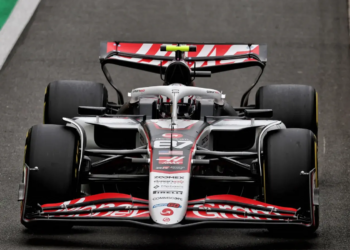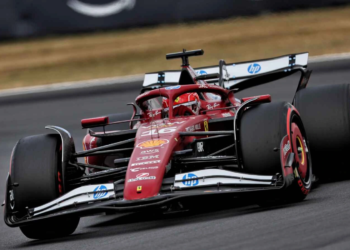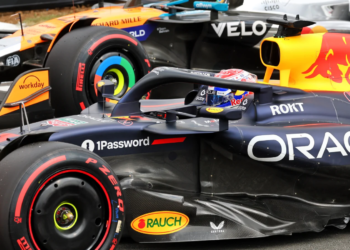The McLaren Formula 1 team is facing complaints from several Dutch health agencies over its promotion of nicotine products through a partnership with VELO.
The VELO brand is British American Tobacco’s attempt to enter the tobacco-free nicotine product industry through flavoured nicotine products, while VUSE-branded vapes and e-cigarettes have also become a recognisable name to fans.
McLaren partnered with BAT in 2019 with its brands becoming more prevalent on McLaren’s F1 cars ever since.
In 2023, VELO or VUSE logos are to feature on the sidepods of the MCL60 in all but seven races.
In April, it was announced that the Dutch government would join the growing list of European administrations banning the advertisement of nicotine products. However, with the legislature still a work in progress, McLaren will continue promoting BAT products at next week’s Dutch Grand Prix as part of a ‘LOVE’ sponsorship campaign – an anagram of the VELO brand.
While a McLaren spokesperson claims that all branding on the company’s race cars “fully complies with regulatory requirements and advertising standards” of all host nations, a Dutch consortium has lodged an official complaint to the Dutch Advertising Code Committee.
The complainants include the Dutch Heart Foundation, the KWF Dutch Cancer Society and the Lung Fund who are keen to stamp out the promotion of a “sickening and deadly business”.

“It just goes to show again how the tobacco industry is doing everything in its power to keep young people addicted in order to keep this sickening and deadly business going,” Carlo van Gils, director of the KWF Dutch Cancer Society stated in a press release.
“We find it bizarre that it is allowed to advertise a product that is banned […] In our opinion, this is contrary to good taste and decency.”
The group complaint to the Advertising Code Commission will argue that advertising cannot be used to encourage behaviour that is harmful to a consumer’s health.
Advertising expert Jan Driessen, who sees McLaren’s partnership as a circumvention of existing regulation, said: “If you know that the bags [snus – another tobacco alternative sold by VELO] are not allowed to be sold in our country, you shouldn’t want to advertise them as an impactful brand.”
Driessen also criticised BAT for its usage of sports to advertise nicotine products, claiming that particularly amongst the youth, athletes are “real heroes” and exploiting the platform could prove more detrimental to consumer health.
McLaren and BAT are yet to respond to the complaints.
Tobacco sponsorship in F1 ‘never really left the sport’
While the days of iconic F1 liveries headlined by cigarette companies including Marlboro, Rothmans and Mild Seven in the late 20th and early 21st centuries are, on the surface, no more, the University of Bath’s TobaccoTactics think tank outlines Big Tobacco’s continued drive for addiction and a pro-nicotine agenda.
Despite the World Health Organisation’s 2005 Framework Convention on Tobacco Control outlawing “all tobacco advertising, promotion and sponsorship”, the total value of tobacco sponsorship in F1 in 2021 was $4.5bn, the same level as 2006 when the industry ban on advertising was implemented.
Tobacco advertising never really left the sport and, through the promotion of non-smoking alternatives, and in 2018, a partnership between Phillip Morris International and Ferrari shifted the focus to the Marlboro owner’s corporate social responsibility and public relations statements through ‘Mission Winnow’.

McLaren and BAT followed suit, promoting the corporate message ‘A Better Tomorrow’ – another subtle nod to the tobacco industry – before opting for overtly promoting the VUSE and VELO brands due to looser regulation on tobacco alternatives.
In 2019, WHO reasserted its calls to governments for the enforcement of advertising bans, particularly in motorsports and F1. Of all major sporting series, F1 holds the largest audience of under-25s with 62% of fans under the age of 35. There is no surprise that the largest motorsport series is an attractive market for tobacco and nicotine companies who look to addict yet another generation. A report by STOP also claimed that F1 fans are amongst the most affluent, only furthering the desire for these companies to exploit viewers.
“It’s the ideal sport for sponsorship. It’s got glamour and worldwide television coverage. It’s a 10 – month activity involving 16 races in 14 countries with drivers from 16 nationalities. After football it’s the Number One multinational sport. It’s got total global exposure, total global hospitality, total media coverage and 600 million people watching it on TV every fortnight … It’s macho, it’s excitement, it’s colour, it’s international, it’s glamour … They’re there to get visibility. They’re there to sell cigarettes.”
Barrie Gill, then CEO of sports sponsorship company Championship Sports Specialists Ltd., in ‘Politics of Tobacco’ pp. 101-103. Published 1984.
In 2019, it was calculated that the exposure gained from McLaren’s promotion of BAT and its associated brands, and retailers such as 7-Eleven, was worth some $27.6m.
One BAT spokesperson claimed in 2019 that the company’s partnership with McLaren was about “accelerating our transforming tobacco ambition [through A Better Tomorrow branding] and driving awareness of potentially reduced-risk products.” However, since being upgraded to a “principal partner” of the British marque, the covert cover-ups are falling away.
The Dutch health organisations’ dissatisfaction with McLaren’s partnership with VELO and BAT is the latest addition to an ever-growing list of tobacco brand critics – and of Formula 1 for allowing the circumvention of existing laws.
It now becomes the duty of local governments and F1 bosses to decide whether to prioritise principle over profit and close loopholes that continue to drive addiction.









